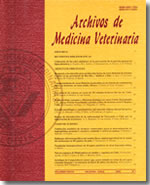Latency values and electrophysiological responses of the different components of the brainstem auditory evoked potentials in rhesus monkeys at different intensities (70-30 dB)
Main Article Content
Abstract
The records of the Brainstem Auditory Evoked Potentials (BAEPs) are sensitive to differences in stimulation parameters, conditions of registration and characteristics of the species, so it is essential to have normal values for each laboratory. The aim of our study was to obtain normative data on the latency values and electrophysiological responses of the different components of the BAEPs in the rhesus monkey, at different intensities (70-30 dB). This study was performed using 14 non-human primates of the Macaca mulatta species, with an average age of 7 years, allotted into two groups of 7 males with an average weight of 7 kg and 7 females weighing approximately 5 kg. The BAEP were obtained by the stimulation of the ear with rarefaction "clicks" of 70, 50 and 30 dB of intensity. The cerebral electric activity was picked up by gold disc electrodes, placed in the Cz (+), A1, A2 (-) and Fz derivations as land, according to the 10/20 international system. Four waves were observed in males and females at the different intensities used. Since no significant differences were found in the Student t-test by separated afferences, afferents were unified, evaluating the absolute latencies of the four waves obtained and the intervals I-II, II-IV and I-IV in the 14 subjects, at different intensities.

